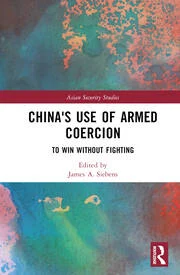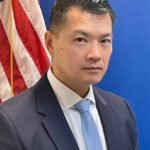
This book is available for purchase directly from the publisher, Routledge in hardback or e-book.
China’s Use of Armed Coercion: To Win Without Fighting analyzes China’s use of its armed forces to coerce other actors in the international system in an effort to achieve policy aims short of armed conflict. Drawing on contributions from primarily next-Generation scholars, the book offers lessons about when, how, why, and to what effect China has used its armed forces in recent decades, to gain insight about China’s intentions and approaches to the use of force in the future.
At a time when the United States is confronting the need to compete with a rising China while avoiding war, it is essential to understand how America’s “pacing threat” uses its armed forces short of war.
Read more about the book here.
Keynote Speaker

Admiral James G. Foggo, Retired four-star Admiral, current Dean of the Center for Maritime Strategy, the Navy League of the United States
Featured Speakers

Ketian Zhang, Assistant Professor of international security, the Schar School of Policy and Government, George Mason University
Ketian Vivian Zhang is an assistant professor of international security in the Schar School of Policy and Government at George Mason University. She studies rising powers, coercion, economic statecraft, and maritime disputes in international relations and social movements in comparative politics, with a regional focus on China and East Asia. Zhang has a broader theoretical interest in linking international security and international political economy.

Jimmy Wang, Nonresident Fellow, Defense Strategy & Planning Project, Reimagining US Grand Strategy, Stimson Center
Mr. Jimmy Wang is a Foreign Affairs Officer specializing in the Asia-Pacific Region, with Chinese as his primary foreign language. He joined the State Department after 20 years of service in the Department of Defense (DoD). He develops cohesive policy recommendations on South China Sea issues, and ensures that policy is coordinated within the wider context of overall U.S. policy objectives.

Melanie W. Sisson, Fellow, Foreign Policy, Strobe Talbott Center for Security, Strategy, and Technology
Melanie W. Sisson is a fellow in the Foreign Policy program’s Strobe Talbott Center for Security, Strategy, and Technology where she researches the use of the armed forces in international politics, U.S. national security strategy, and military applications of emerging technologies. Sisson’s current work focuses on U.S. Department of Defense integration of artificial intelligence (AI) and machine learning capabilities into warfighting and enterprise operations.

Pamela Kennedy, Deputy Director, China Program, Stimson Center
Pamela Kennedy is Deputy Director of the China program at the Stimson Center. She holds a M.A. in International Relations and International Economics from Johns Hopkins University School of Advanced International Studies and a B.A. summa cum laude in Government and East Asian Studies from the College of William and Mary. Kennedy interned with the CSIS’ Japan Chair and the Reischauer Center for East Asian Studies. She was previously an Associate Examiner with the Federal Reserve Bank of San Francisco.
Moderator

James A. Siebens, Fellow, Defense Strategy & Planning Project, Reimagining US Grand Strategy Program, Stimson Center
James A. Siebens is a Fellow with the Stimson Center’s Reimagining U.S. Grand Strategy program, where he leads the Defense Strategy and Planning project. He is the editor of China’s Use of Armed Coercion: To Win Without Fighting (Routledge 2023), and co-editor of Military Coercion and U.S. Foreign Policy: The Use of Force Short of War (Routledge 2020).
